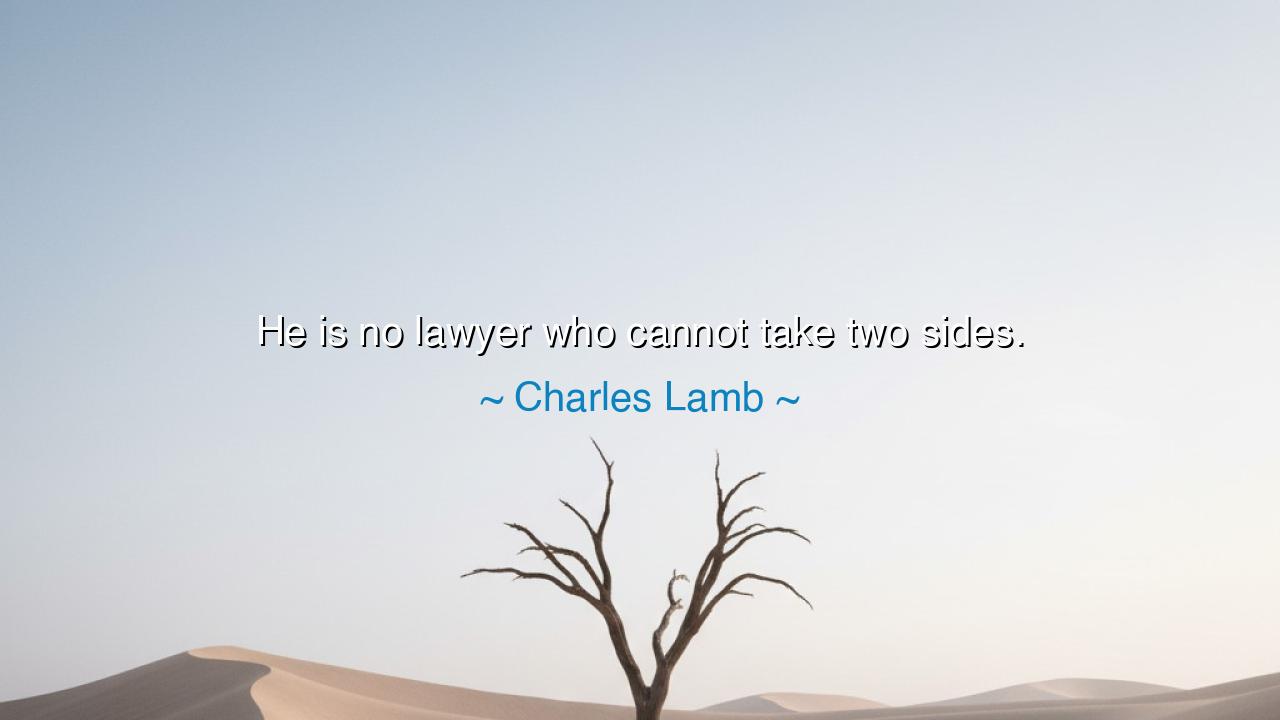
He is no lawyer who cannot take two sides.






The words of Charles Lamb, “He is no lawyer who cannot take two sides,” resound with both irony and insight. In this brief declaration, Lamb uncovers the very essence of the legal profession: the ability to argue, with reason and eloquence, not merely from one perspective, but from either. For the lawyer, unlike the partisan or zealot, must be trained to understand the shifting sands of argument, to give voice even to positions contrary to his own conviction. It is not loyalty to one side alone that marks the advocate, but mastery of both—like a swordsman who can strike with either hand.
The origin of this saying lies in Lamb’s wit and his observations of human nature. Known for his essays filled with humor and wisdom, he often reflected on professions and their paradoxes. The law, in his day as in ours, was filled with men trained to defend causes not because they were just, but because they were theirs. Lamb, with a sharp tongue, both mocked and revealed this truth: that the skill of the lawyer lies not in his morality, but in his flexibility, his ability to shape words and logic to any side of a question. To “take two sides” was not hypocrisy to Lamb, but proof of professional craft.
History gives us many mirrors of this truth. Consider Cicero, the great Roman orator and lawyer. Time and again, he defended causes not because he believed in them, but because his art demanded it. He defended the corrupt governor Verres in one case, while in another he rose as prosecutor against the very abuses such men embodied. His greatness lay not in consistency of cause, but in brilliance of argument. He could take two sides, and this skill made him formidable. Lamb’s words, though tinged with jest, echo Cicero’s life: the lawyer is measured not by the justice he serves, but by the flexibility of his tongue and mind.
The deeper meaning of Lamb’s statement is not confined to the courtroom. It speaks to the human condition itself. For what is wisdom, if not the ability to see with more than one eye, to hear with more than one ear? To argue only from one perspective is to be half-blind. But to understand and express opposing sides is to glimpse the fullness of truth, even if one never embraces it entirely. The lawyer, then, becomes a symbol of the mind trained to move beyond partisanship into the realm of deeper understanding, though often for worldly rather than noble ends.
Yet Lamb’s words also carry warning. To take two sides without conscience may lead to cynicism, where truth itself is forgotten amidst the game of winning. The advocate risks becoming a mercenary of words, wielding argument as a weapon without regard to justice. This is the shadow side of the lawyer’s art—the danger that flexibility becomes moral emptiness. Thus Lamb’s wit, while playful, strikes at the heart of a serious dilemma: can one master the art of two-sided argument and yet remain true to conscience?
The lesson for us, then, is twofold. First, cultivate the ability to see both sides of any matter. Do not cling blindly to one perspective, but train your mind to enter into the reasoning of those who oppose you. In this lies strength, wisdom, and humility. Second, do not let this skill erode your integrity. Though you may understand both sides, choose your cause with care, and let your final loyalty be to truth and justice, not to the mere cleverness of argument.
Therefore, let us live as men and women who can argue with breadth but decide with conscience. In disputes, let us listen before we speak, weigh before we judge, and seek to understand even what we oppose. For to master both sides is the mark of intellect, but to choose rightly between them is the mark of character.
So let Lamb’s words endure: “He is no lawyer who cannot take two sides.” May they remind us that skill without perspective is weakness, and perspective without conscience is emptiness. Let us strive to hold both—understanding the many sides of life, yet standing firm for what is just and true. For in this union lies the path of wisdom.






AAdministratorAdministrator
Welcome, honored guests. Please leave a comment, we will respond soon